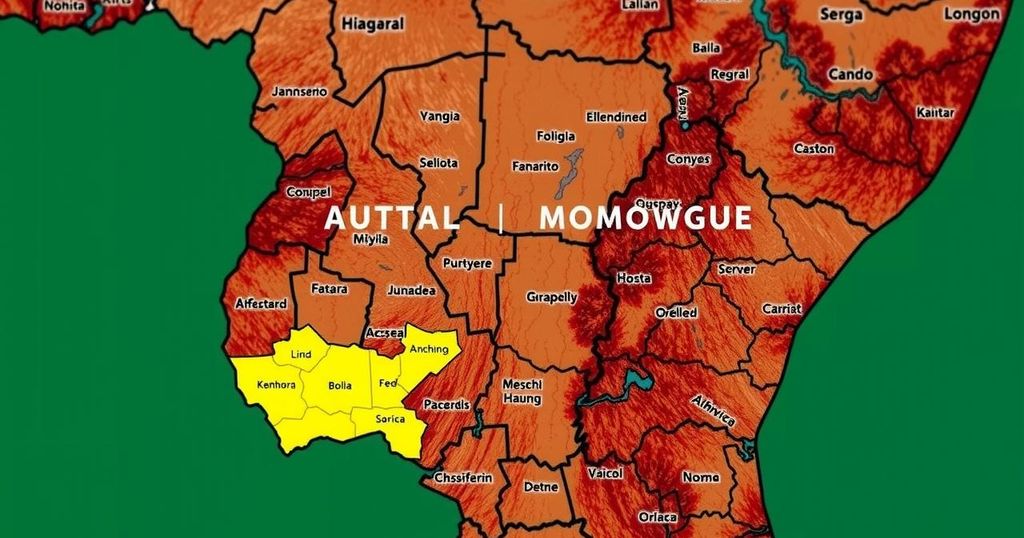World news
AFRICA, AP, AP FOTO, CARLOS U, CARLOS UQUEIO, DANIEL CHAPO, DEMOCRACY, DURANTE LAS, ELEC, EN MAPUTO, FR, HUMAN RIGHTS, JOHANNESBURG, LA CAPITAL DE MOZAMBIQUE, LEBOMBO, LLAMAS, MAPUTO, MOZAMBIQUE, POLITICS, SOUTH AFRICA, SOUTHERN AFRICA, SOUTHERN AFRICAN DEVELOPMENT COMMUNITY, UNA, VE, VENANCIO MONDLANE, VIOLENCE
Ethan Kim
0 Comments
Post-Election Violence in Mozambique: Implications for Southern Africa
Mozambique is experiencing significant unrest after the disputed Oct. 9 elections, where the ruling Frelimo party was declared the winner. This post-election violence has resulted in at least 30 deaths and has alarmed neighboring states due to its implications for regional stability and trade. Upcoming Southern African Development Community summit discussions may focus on these issues, emphasizing the need for credible electoral processes across the region.
Mozambique is currently facing significant unrest following the contentious outcomes of the Oct. 9 elections, where the ruling Frelimo party emerged victorious. Protests erupted, leading to fatalities and demonstrations questioning the election results, particularly from Venancio Mondlane, an independent candidate and runner-up. The ensuing violence raises concerns not only for Mozambique but for the stability of the entire Southern African region, where elections have varied widely in integrity. Regional dynamics will likely be a central topic at the forthcoming Southern African Development Community summit as unrest in Mozambique can destabilize neighboring states. Despite some Southern African countries demonstrating democratic resilience with credible elections, Mozambique’s situation casts a shadow, accentuating ongoing electoral challenges within the region. The European Union’s observers flagged irregularities in the recent elections, reflecting a troubling pattern of disputed elections that has plagued not only Mozambique but also Zimbabwe, further complicating the political landscape in Southern Africa. The impact of Mozambique’s instability extends beyond political ramifications to economic repercussions, particularly concerning trade. The nation serves as a vital conduit for trade in Southern Africa, particularly for South Africa, which relies on the Maputo port for mineral exports. The closure of South Africa’s border with Mozambique due to the protests has reportedly cost the South African economy millions daily, highlighting how one country’s political challenges can engender economic consequences for neighboring states. Additionally, the historical context of Mozambique, emerging from a civil war and dealing with recent insurgent activities, complicates efforts for political stability. The humanitarian situation exacerbates as populations continue to migrate within the region, fleeing violence and seeking economic opportunities. Hence, any further deterioration in Mozambique’s security situation could lead to increased regional instability, necessitating swift and coordinated responses from Southern African nations.
The post-election violence in Mozambique is a significant concern for the Southern African region due to its implications for political stability and economic interactions among neighboring countries. Mozambique’s ruling party, Frelimo, has maintained control for nearly half a century, but public discontent regarding electoral integrity has escalated into protests following the disputed recent elections. This unrest has not only resulted in casualties but has also compelled neighboring countries, such as South Africa, to reassess border security, thereby affecting regional trade and economic stability. The context of Mozambique’s long history of civil strife and its ongoing struggles with insurgencies further exacerbates the potential for regional instability, as the ramifications of violence and migration ripple through Southern Africa.
In summary, the post-election violence in Mozambique represents a cause for concern for the Southern African region due to the potential for political instability and its detrimental effects on regional trade and economic relations. As neighboring countries grapple with the fallout from Mozambique’s unrest, the increasing challenges of maintaining credible elections and ensuring stability are pressing issues that must be addressed. The situation underscores the necessity for a concerted effort among Southern African nations to safeguard democratic processes and promote socio-political stability.
Original Source: apnews.com




Post Comment